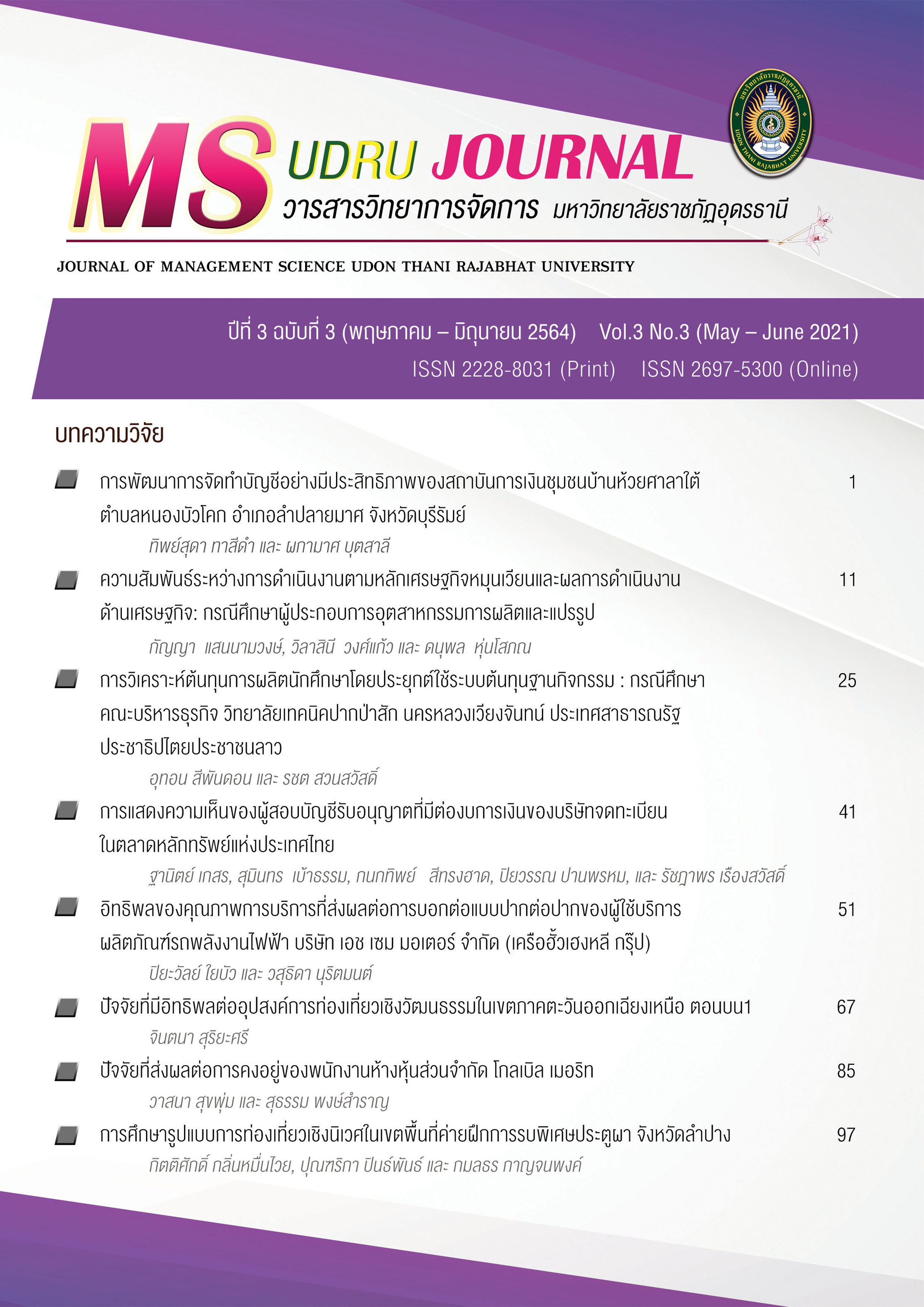การศึกษารูปแบบการท่องเที่ยวเชิงนิเวศในเขตพื้นที่ค่ายฝึกการรบพิเศษประตูผา จังหวัดลำปาง
Main Article Content
บทคัดย่อ
การวิจัยในครั้งนี้มีวัตถุประสงค์เพื่อศึกษาศักยภาพและรูปแบบการท่องเที่ยวเชิงนิเวศที่เหมาะสมในเขตพื้นที่ค่ายฝึกรบพิเศษประตูผา จังหวัดลำปาง ประกอบด้วยการศึกษารูปแบบของแหล่งท่องเที่ยวเชิงนิเวศ รูปแบบด้านกิจกรรม รูปแบบคุณค่าการท่องเที่ยวเชิงนิเวศและความสนใจของนักท่องเที่ยวต่อรูปแบบการท่องเที่ยวเชิงนิเวศ เก็บรวบรวมข้อมูลด้วยแบบสอบถามและแบบสัมภาษณ์ โดยแบบสอบถามเก็บกับกลุ่มตัวอย่างจำนวน 380 คน ในขณะที่แบบสัมภาษณ์เก็บกับกลุ่มผู้ให้ข้อมูลเชิงลึกระดับนโยบายจำนวน 7 คน วิเคราะห์ข้อมูลด้วยสถิติพรรณนา และการวิเคราะห์ SWOT เพื่อให้ได้ชุดข้อมูลศักยภาพสำหรับการสนทนากลุ่มในการศึกษารูปแบบการท่องเที่ยวเชิงนิเวศที่เหมาะสมในเขตพื้นที่ค่ายฝึกการรบพิเศษประตูผา จังหวัดลำปาง ผลการวิจัยพบว่าเขตพื้นที่ค่ายฝึกการรบพิเศษประตูผามีศักยภาพมากในการเป็นแหล่งท่องเที่ยวเชิงนิเวศ เนื่องด้วยมีทรัพยากรเชิงนิเวศทางธรรมชาติที่เหมาะสมมีความหลากหลาย และมีความพร้อมทางด้านการจัดกิจกรรมเชิงนิเวศ โดยรูปแบบการท่องเที่ยวที่นักท่องเที่ยวให้ความสนใจเป็นพิเศษ คือ การศึกษาเส้นทางธรรมชาติ การเดินป่า การตั้งเต็นท์และการทำกิจกรรมผจญภัยต่าง ๆ ซึ่งเป็นกิจกรรมที่หาทำได้ยาก เช่น การโดดหอ ไต่หน้าผาจำลอง เป็นต้น ซึ่งรูปแบบการท่องเที่ยวที่เหมาะสมในการจัดกิจกรรมท่องเที่ยวเชิงนิเวศในเขตพื้นที่ค่ายฝึกรบพิเศษประตูผานี้ จะนำไปสู่ รูปแบบการท่องเที่ยวอย่างยั่งยืน ที่เป็นการสอดแทรกความรู้ให้กับนักท่องเที่ยวได้เรียนรู้และเกิดประสบการณ์จริงและนำไปใช้ในชีวิตประจำวันได้
Article Details

อนุญาตภายใต้เงื่อนไข Creative Commons Attribution-NonCommercial-NoDerivatives 4.0 International License.
บทความที่ได้รับการตีพิมพ์เป็นลิขสิทธิ์ของคณะวิทยาการจัดการ มหาวิทยาลัยราชภัฏอุดรธานี
ข้อความที่ปรากฏในบทความแต่ละเรื่องในวารสารวิชาการเล่มนี้
ไม่ใช่ความคิดเห็นและความรับผิดชอบของผู้จัดทำ บรรณาธิการ กองบรรณาธิการ และคณะวิทยาการจัดการ มหาวิทยาลัยราชภัฏอุดรธานี ความรับผิดชอบด้านเนื้อหาและการตรวจร่างบทความแต่ละเรื่องเป็นความคิดเห็นของผู้เขียนบทความแต่ละท่าน
เอกสารอ้างอิง
กลุ่มงานข้อมูลข่าวสารและประชาสัมพันธ์. (2562). “ข้อมูลทั่วไปกองร้อยฝึกรบพิเศษที่ 3 ค่ายฝึกการรบพิเศษประตูผา อำเภอแม่เมาะ จังหวัดลำปาง”. สืบค้นเมื่อ 9 สิงหาคม 2562, จาก http://www.thaipatch.com/index.php?lay=boardshow&ac=webboard_show&No=332441
กลุ่มงานข้อมูลสารสนเทศและการสื่อสาร. (2562). “ประวัติศาสตร์นครลำปาง”. สืบค้นเมื่อ 20 สิงหาคม 2562, จาก http://www.lampang.go.th/lamp.html
การท่องเที่ยวแห่งประเทศไทย. (2559). บทวิเคราะห์สถานการณ์การตลาดการท่องเที่ยวไทยในต่างประเทศ. จุลสารวิชาอิเล็กทรอนิกส์ การท่องเที่ยวแห่งประเทศไทย : กรุงเทพฯ 11(1), 12-14.
ธีราภรณ์ นกแก้ว. (2555). การท่องเที่ยวเชิงอนุรักษ์ กรณีศึกษาตลาดน้ำวัดไทร กรุงเทพมหานคร. วารสารวิจัยมหาวิทยาลัยสวนดุสิต สาขามนุษยศาสตร์และสังคมศาสตร์, 8(1), 49-60.
ไพฑูรย์ พงศะบุตร, ณิฏฐารัตน์ ปภาวสิทธิ์, จิรายุพิน จันทรประสงค์, และ ก่องกานดา ชยามฤต. (2552). สารานุกรมไทยสำหรับเยาวชน ฉบับเสริมการเรียนรู้ เล่ม 5. กรุงเทพฯ: โครงการสารานุกรมไทยสำหรับเยาวชน โดยพระราชประสงค์ในพระบาทสมเด็จพระเจ้าอยู่หัว.
สมชาย วรกิจเกษมสกุล. (2554). ระเบียบวิธีการวิจัยทางพฤติกรรมศาสตร์และสังคมศาสตร์. อุดรธานี: อักษรศิลป์การพิมพ์.
Buhalis, D. (2000). Strategic ues of information technologies in the tourism industry. Tourism Management. Essex: Pearson Education.
Cronbach, L. J. (1984). Essential of psychology testing. New York: Harper and Row Publishers.
Dickman, S. (1997). Tourism: An Introductory Text. Holder Education, New South Wales: Rydalmere.
Lauku, C. (2011). Service Marketing. New York : Harper Collins.
Likert, R. (1967). The Method of Constructing and Attitude Scale. Reading in AttitudeTheory and Measurement. New York: Wiley & Son.
Tsiotsou, R. H., & Goldsmith, R. E. (2012). Strategic marketing in tourism services. Bingley: Emerald Group
Yamane, T. (1973). Statistics: An Introductory Analysis. 3rd ed. Singapore: Harper International Editor.


